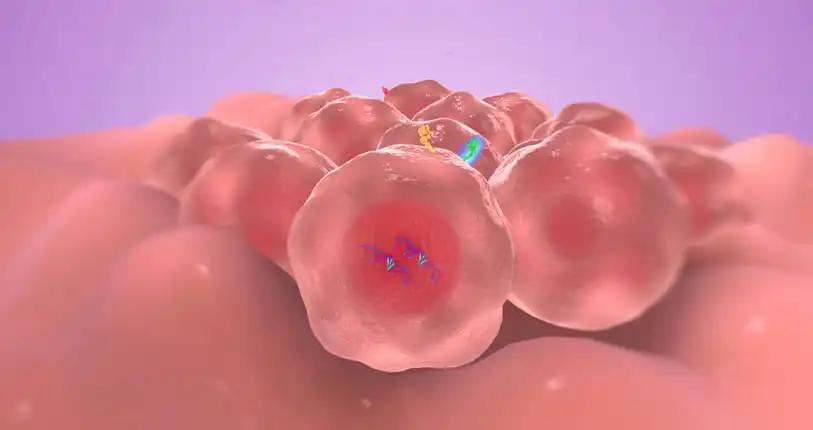KEY TAKEAWAYS
- The phase I trial aimed to evaluate the safety, tolerability, and preliminary antitumor activity of COM701 combined with nivolumab in MBC patients.
- The results demonstrated that the combination was well tolerated with promising antitumor activity in heavily pretreated TMB-low MBC patients; further data to report will be presented.
COM701, a pioneering anti-PVRIG immune checkpoint inhibitor, activates T-cells by targeting PVRL2, highly expressed in breast cancer. Promising antitumor responses, including partial and complete responses, were observed in solid tumor patients (MSS-CRC, platinum-resistant OVCA, anal squamous CA, MSS-endometrial cancer) treated with COM701 ± nivolumab + BMS-986207 (anti-TIGIT antibody).
Ecaterina Dumbrava and her research team conducted the study that aimed to report findings from the dose expansion cohort evaluating the combination of COM701 and nivolumab in patients diagnosed with metastatic breast cancer (MBC).
The study enrolled 17 patients with metastatic breast cancer (MBC). All participants received COM701 at 20 mg/kg and nivolumab at 480 mg, administered intravenously every 4 weeks. The primary objectives were to assess safety and tolerability, while the secondary objective was to evaluate preliminary antitumor activity. Inclusion criteria required participants to be aged ≥18 with histologically confirmed locally advanced or MBC, regardless of ER/PR and HER2 status, and to have measurable disease after exhausting standard treatments.
Prior treatment with anti-PD-(L)-1 and anti-CTLA-4 immune checkpoint inhibitors was permissible. Exclusion criteria included a history of immune-related events leading to immunotherapy discontinuation and pneumonitis. Safety was evaluated per CTCAE v4.03, and investigator responses were assessed according to RECIST v1.1.
Treatment related adverse events (TRAEs) in 12 out of 17 (71%) patients, with the majority (11 out of 12 patients) being of Grade 2 or lower severity. The most common adverse event was diarrhea, observed in 3 patients, all of Grade 1. One patient experienced a Grade 3 treatment-related adverse event of pneumonitis, which subsequently recovered, and no Grade 4 or higher adverse events were reported.
Tumor assessments by site revealed that 9 out of 17 patients (53%) were PD-L1 negative, 2 out of 17 (12%) were PD-L1 positive or present, and in 6 out of 17 patients (35%), PD-L1 status was either missing or not assessed. Tumor mutational burden (TMB) was low (<10 mut/MB) in 10 out of 17 patients (59%), and for 7 out of 17 patients (41%), TMB status was either missing or not assessed.
The objective response rate (ORR) was observed in 2 out of 17 patients (12%), with one patient achieving a complete response (CR) in the setting of ER+/PR-, HER2- invasive ductal carcinoma. This patient, who had PD-L1 CPS of 3, PVRL2 tumor H-score of 300 (both assessed by the sponsor), and low TMB (5 Mut/Mb), had undergone 3 prior lines of therapy and continued on the study treatment for 567 days. Another patient with triple-negative breast cancer (TNBC), PD-L1 negative, and TMB-low (1 Mut/Mb), achieved a partial response (PR) and remained on study treatment for 296 days after 4 prior lines of therapy.
About 3 patients exhibited stable disease, all with PD-L1 CPS<1 and low TMB.
The disease control rate (CR+PR+SD) was 5 out of 17 patients (29%). Among patients showing clinical benefit and having available serum samples, an increase in interferon-gamma (IFNg) levels at Cycle 2–3 was observed compared to baseline.
The combination demonstrated good tolerability, with no dose-limiting toxicity (DLT) observed. Preliminary results indicated promising antitumor activity, including partial responses (PR) and complete responses (CR) in extensively treated patients with low TMB MBC. Further clinical and translational data will be presented during the conference.
Research is sponsored by Compugen Ltd.
Source: https://jitc.bmj.com/content/11/Suppl_1/A732
Clinical Trial: https://clinicaltrials.gov/study/NCT03667716
Dumbrava E, Chmielowski B, Shepard D, et al. (2023).’’The combination of COM701 + nivolumab demonstrates preliminary antitumor activity in patients with metastatic breast cancer.’’ Presented at SITC 2023 (640).



